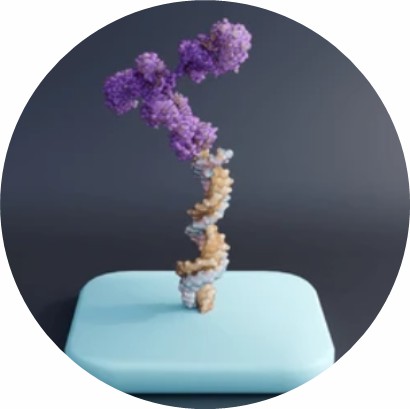RNA-based Gene Therapy Development Services
Inquiry
RNA-based gene therapy offers a versatile and promising approach to combatting cancer by exploiting the regulatory functions of RNA molecules to modulate gene expression and cellular processes. At Alfa Cytology, we specialize in developing innovative RNA-based therapies that target specific genetic aberrations implicated in cancer progression.
Overview of RNA-based Gene Therapy
Cancer is characterized by genetic alterations that drive abnormal cell growth and proliferation. RNA-based gene therapy presents a promising approach to intervene in these processes by modulating gene expression, inhibiting oncogenic pathways, and enhancing the body's natural defenses against cancer. At Alfa Cytology, our RNA-based gene therapy development services focus on leveraging RNA molecules, including small interfering RNA (siRNA), microRNA (miRNA), and messenger RNA (mRNA), to develop targeted and potent therapies for various types of cancer.
 Fig.1 Overview of Major Developments in the RNA-targeting Field. (Zhu, Y., et al., 2022)
Fig.1 Overview of Major Developments in the RNA-targeting Field. (Zhu, Y., et al., 2022)
Various delivery methods are utilized, including viral vectors, non-viral vectors, and physical techniques like electroporation. DNA-based gene therapy holds promise for personalized cancer treatment, offering potential alternatives to traditional therapies like chemotherapy and radiation. Ongoing research aims to optimize delivery strategies, enhance treatment specificity, and improve safety profiles, advancing the field towards more effective cancer therapies.
Our Services
Our RNA-based gene therapy development services are tailored to deliver personalized treatment solutions that harness the unique functionalities of RNA molecules. Through a combination of cutting-edge molecular biology techniques and advanced delivery systems, we strive to optimize treatment outcomes while minimizing off-target effects. Followings are the RNA-based strategies we offer.

Antisense oligonucleotides (ASOs)
Harness the power of Antisense oligonucleotides (ASOs) to target specific RNA sequences involved in cancer development and progression. ASOs bind to complementary RNA sequences, thereby inhibiting gene expression or modulating RNA splicing, ultimately suppressing tumor growth.

RNA interference (RNAi)
We leverage RNA interference (RNAi) technology to silence the expression of specific genes involved in cancer development and progression. By delivering small interfering RNAs or short hairpin RNAs, we can selectively inhibit the expression of oncogenes or other cancer-promoting genes, effectively suppressing tumor growth.

CRISPR-based genome editing
Utilize CRISPR-based genome editing techniques to precisely modify RNA molecules, correct disease-causing mutations, or modulate gene expression patterns. Our innovative approach allows for targeted RNA therapies that address the underlying molecular abnormalities driving cancer progression.

Aptamer
Explore the potential of Aptamers, single-stranded RNA molecules that bind to specific targets, as therapeutic agents in cancer treatment. Aptamers offer precise targeting capabilities, enabling the delivery of therapeutic payloads directly to cancer cells while minimizing off-target effects.

mRNAs and mRNA vaccine
injected mRNA vaccines are delivered into the cytoplasm of the host cell and are translated into the targeted antigens. Subsequently, the major histocompatibility complexes (MHCs) present the expressed antigens to the surface of APCs to activate B cell/antibody-mediated humoral immunity and CD4+ T/CD8+ cytotoxic T-cell-mediated immunity.
The Advantages of Our Gene Therapy Development Service
- Precision Targeting: Our RNA-based gene therapy interventions selectively target the molecular pathways and genetic aberrations driving cancer progression, minimizing off-target effects and reducing the risk of adverse reactions.
- Immunostimulatory Effects: mRNA-based vaccines stimulate robust immune responses against cancer cells, harnessing the power of the immune system to recognize and eliminate tumor cells effectively.
- Versatile Applications: RNA-based gene therapy offers a versatile platform for developing a wide range of therapeutic modalities, from gene silencing to immunotherapy, providing flexible and adaptable treatment options for patients with diverse cancer types.
Experience the transformative potential of RNA-based gene therapy in cancer treatment with Alfa Cytology. Our multidisciplinary team of experts is dedicated to advancing the field of RNA-based therapeutics and delivering personalized treatment solutions that make a meaningful difference in patients' lives. Contact us today to learn more about our RNA-based gene therapy development services and discover how we can help you combat cancer with precision and efficacy.
Reference
-
Zhu, Y., et al.; (2022). RNA-based therapeutics: an overview and prospectus. Cell death & disease, 13(7), 644.
For research use only.
Related Services



 Fig.1 Overview of Major Developments in the RNA-targeting Field. (Zhu, Y., et al., 2022)
Fig.1 Overview of Major Developments in the RNA-targeting Field. (Zhu, Y., et al., 2022)



